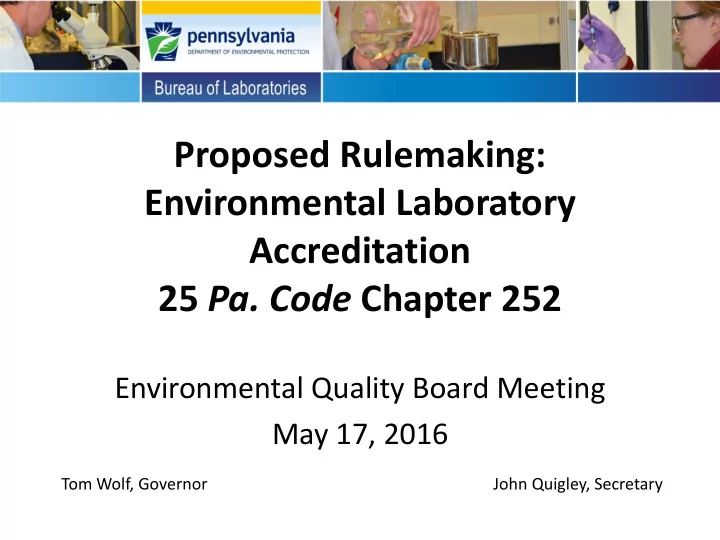

Proposed Rulemaking: Environmental Laboratory Accreditation 25 Pa. Code Chapter 252 Environmental Quality Board Meeting May 17, 2016 Tom Wolf, Governor John Quigley, Secretary
Background • Environmental Laboratory Accreditation Act, June 29, 2002, 27 Pa C.S. § 4103(a) – “The department shall establish an accreditation program for environmental laboratories.” • 25 Pa. Code Chapter 252 – Promulgated January, 28, 2006 – Updated April 10, 2010
Regulation Development • Laboratory Accreditation Advisory Committee (LAAC) – PA Water Environment Association (PWEA) – PA Rural Water Association – Small Environmental Laboratory – Commercial Environmental Laboratory – Public Water Supply – Industrial Laboratory – Academic Laboratory – Wastewater Treatment Plant Laboratory – Environmental Engineering Firm – Large NELAP Laboratory – General Public • LAAC met throughout 2014 and 2015 in public meetings • Unanimous approval of Draft Proposed Rulemaking – December 2, 2015
Program Activities Objectives Program Activities • Add necessary standards for accreditation • Clarify existing requirements • Amend cost prohibitive requirements • Amend fee structure
Stakeholders Affected • Scope of the regulation remains unchanged – No new regulated entities • >4000 registered laboratories – ABR parameters only, no fees, no applications • 311 state accredited laboratories – 250 small labs – 46 medium labs – 15 large labs • 125 NELAP accredited laboratories – 33 primary NELAP labs – 92 secondary NELAP labs
Summary of Changes • Necessary additions to the regulation: – Credit hours for microbiology supervisor – Qualifications for WETT supervisor – Sample acceptance and handling requirements – Analytical test report requirements – Temperature distribution studies for incubators – Criteria for establishing acceptance limits – Explanation of DEP’s authority to suspend, revoke, or deny accreditation based on non-compliance found during on-site assessments – NELAP equivalency sections
Summary of Changes • Clarifications to current regulation: – Procedures for recordkeeping – College-semester credit hours must be from an accredited college or university – Requirements for microbiology quality control checks – Corrective action report requirements – Requirements for evaluating and reporting drinking water compliance testing results
Summary of Changes Summary of Changes Summary of Changes • Amendment of Cost Prohibitive Requirements: – Reduce amount of hands-on experience requirements for microbiology and inorganic non-metals supervisors – Allow college credit hours in health physics for radiochemistry supervisors – Allow a lab supervisor to be absent for 21 days instead of limiting to 16 days – Define “working - day” for monitoring refrigerators and freezers – Allow DEP to develop procedures for offsite assessments – Allow DEP to suspend a lab’s accreditation for some violations instead of requiring revocation
Summary of Changes • Fee structure changes: – Increased initial and renewal fees for all laboratories – Increased each category fee by $100-250 – Added a fee category for complicated microbiology testing – Increased the travel reimbursement rate for out- of-state on-site assessments
Accreditation Fee Analysis Program Activities Program Activities • Lab Accreditation Fee Report presented to Board on April 19, 2016 • 25 Pa. Code Chapter 252: Fees - § 252.204(a) FY 13-14 FY 14-15 FY 15-16* FY 16-17* Fee Collections $1,658,783.55 $1,519,882.97 $1,550,000.00 $1,550,000.00 Program Costs $1,606,203.61 $1,585,8688.40 $1,675,044.00 $1,708,545.00 *Projected Amounts
Accreditation Fee Analysis • Factors Impacting Revenues: – Wage and benefit increases for program and support staff – Overall increases in operational expenses: rent, travel expenses, information technology, etc. – Reduction in secondary NELAP applications – Consolidation of operations within corporate laboratory locations
Examples of Laboratory Fees Small POTW Laboratory Current Fee Structure: Proposed Fee Structure: Renewal Application Fee $500 Renewal Application Fee $700 Basic NPW Fee $750 Basic NPW Fee $850 Total $1250 Total $1550 Difference in Fee = $300 per year
Examples of Laboratory Fees Medium Laboratory Current Fee Structure: Proposed Fee Structure: Renewal Application Fee $500 Renewal Application Fee $700 Micro (2 Matrices) $950 Basic Micro (2 Matrices) $1350 Non-Metals (2 Matrices) $1150 Non-Metals (2 Matrices) $1550 Trace Metals (2 Matrices) $1050 Trace Metals (2 Matrices) $1350 Volatiles (2 Matrices) $1250 Volatiles (2 Matrices) $1550 Total $4900 Total $6500 Difference in Fee = $1600 per year
Examples of Laboratory Fees Large NELAP Laboratory Current Fee Structure: Proposed Fee Structure: Renewal Application Fee $2000 Renewal Application Fee $2750 Micro (3 Matrices) $1350 Micro (3 Matrices) $1800 Non-Metals (3 Matrices) $1650 Non-Metals (3 Matrices) $2150 Trace Metals (3 Matrices) $1500 Trace Metals (3 Matrices) $1900 Volatiles (3 Matrices) $1800 Volatiles (3 Matrices) $2200 Semi-Volatiles (3 Matrices) $4200 Semi-Volatiles (3 Matrices) $4800 Total $12500 Total $15600 Difference in Fee = $3100 per year
Recommendation to EQB • Approval of Proposed Rulemaking • 30-day Comment Period
Dr. Martina Q. McGarvey Director, Bureau of Laboratories mmcgarvey@pa.gov Aaren S. Alger Chief, Laboratory Accreditation Program aaalger@pa.gov William Cumings Bureau of Regulatory Counsel wcumings@pa.gov
Recommend
More recommend